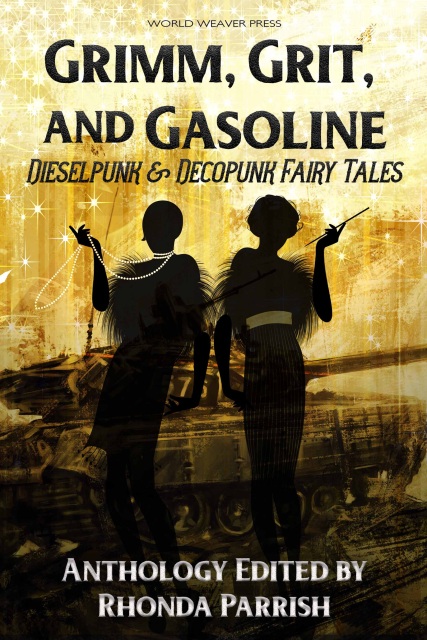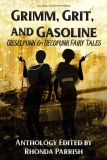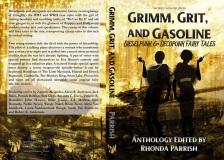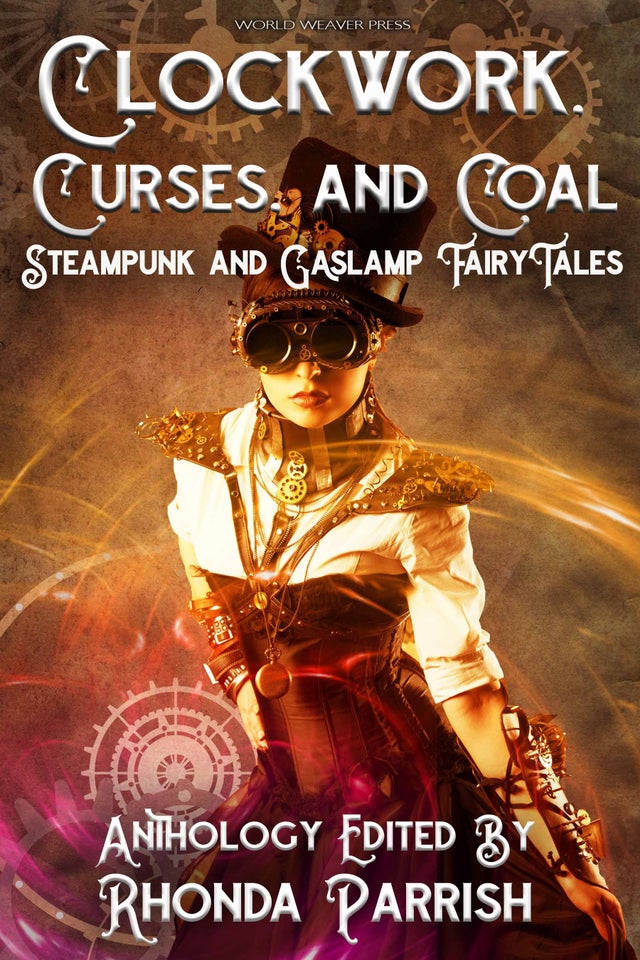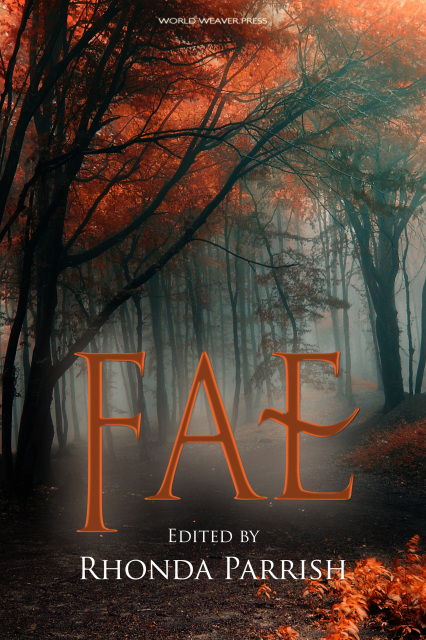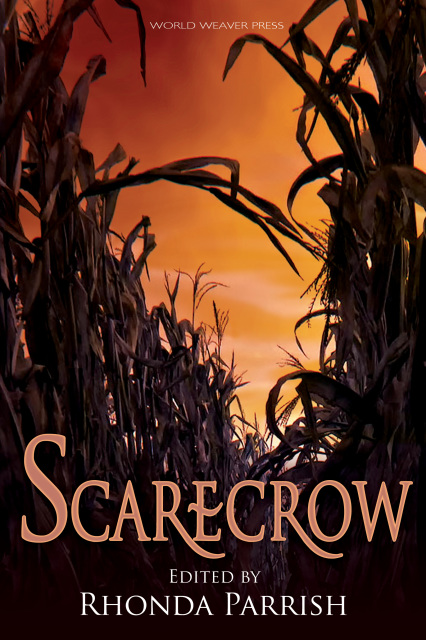- Store
- >
- Trade Paperback
- >
- Grimm, Grit, and Gasoline
Grimm, Grit, and Gasoline
SKU:
$15.95
$15.95
Unavailable
per item
Anthology edited by Rhonda Parrish.
Series: Punked Up Fairy Tales
Fantasy / Short Story Anthology
Release Date: September 3, 2019
Trade Paperback
ISBN-13: 978-1732254664
Anthology: Approx. 88,000 words / 300 pages
Also available as an ebook
Find it Online:
Amazon
Barnes & Noble
Books-A-Million
Goodreads
Independent Bookstores
iTunes/Apple iBooks
Kobo
Wholesale: Ingram or direct: World Weaver Press.
Series: Punked Up Fairy Tales
Fantasy / Short Story Anthology
Release Date: September 3, 2019
Trade Paperback
ISBN-13: 978-1732254664
Anthology: Approx. 88,000 words / 300 pages
Also available as an ebook
Find it Online:
Amazon
Barnes & Noble
Books-A-Million
Goodreads
Independent Bookstores
iTunes/Apple iBooks
Kobo
Wholesale: Ingram or direct: World Weaver Press.
Sold Out
DescriptionDieselpunk and decopunk are alternative history re-imaginings of (roughly) the WWI and WWII eras: tales with the grit of roaring bombers and rumbling tanks, of 'We Can Do It' and old time gangsters, or with the glamour of flappers and Hollywood starlets, smoky jazz and speakeasies. The stories in this volume add fairy tales to the mix, transporting classic tales to this rich historical setting.
Two young women defy the devil with the power of friendship. The pilot of a talking plane discovers a woman who transforms into a swan every night and is pulled into a much more personal conflict than the war he’s already fighting. A pair of twins with special powers find themselves in Eva Braun’s custody and wrapped up in a nefarious plan. A team of female special agents must destroy a secret weapon–the spindle–before it can be deployed. Retellings of The Little Mermaid, Hansel and Gretel, Rapunzel, Cinderella, The Monkey King, Swan Lake, Pinocchio and more are all showcased alongside some original fairy tale-like stories. Table of Contents“Circles and Salt” by Sara Cleto
“Salvage” by A.A. Medina “The Loch” by Zannier Alejandra “Evening Chorus” by Lizz Donnelly “To Go West” by Laura VanArendonk Baugh “Bonne Chance Confidential” by Jack Bates “늑대 - The Neugdae” by Juliet Harper “The Rescue of Tresses Malone” by Alena Van Arendonk “Daughters of Earth and Air” by Robert E. Vardeman “Easy as Eating Pie” by Amanda C. Davis “Accidents are Not Possible” by Sarah Van Goethem “A Princess, a Spy, and a Dwarf Walked into a Bar Full of Nazis” by Patrick Bollivar “Steel Dragons of a Luminous Sky” by Brian Trent “Ramps and Rocket” by Alicia K Anderson “As The Spindle Burns” by Nellie K. Neves “Make This Water No Deeper” by Blake Jessop “One Hundred Years” by Jennifer R. Donohue “Things Forgotten on the Cliffs of Avevig” by Wendy Nikel ExcerptsFrom "Circles and Salt" by Sara Cleto:
The truth is that I’ve been dancing, moving, running since I was fourteen. Before that, I was a dreamier creature altogether, a girl who could sink into stillness like a bucket into a well. I loved reading. I loved the slow, methodical way soup came together in a pot if I stood beside it and stirred. I loved watching the leaves fall from the apple tree outside my window. My father called me lazy, though I tended all the animals on his farm and made three meals for us each day. The way I could stand still and look steadily at anything made him uncomfortable. He says he didn’t mean to do it, and I do my best to believe him, but at night when I lay in bed, careful to keep my arms and legs tucked carefully into my body, I am quite sure he did. Everyone knows not to trust strangers in the wood. But when a man with a black hat and cold, cruel smile told him he’d pay half a million dollars for whatever stood in his backyard, he agreed. “Well of course I thought it was nothing but the apple tree,” he told me later. “How was I to know you were out there, staring at nothing? You should have been busy making dinner by then.” I looked at him in the steady way he hated for a long moment. Then I moved. From "Evening Chorus" by Lizz Donnelly: The Nattergalen was lit up every night with the glow of neons and the hum of chatter from the City’s most elegant citizens. Martinis flowed freely and the occasional guest spilled drunkenly into the street. Of all the bars in the city, the Nattergalen was the place to be and be seen. It was owned by a man known only as The Emperor; no one alive remembered him by any other name. The Nattergalen was famous for being, and owning, the best: every surface gleamed with gold and chrome. The flowers were always real, and rare, the liquor was top shelf, and the cigars were always Cuban, even after the country itself was gone. Still, the thing the Nattergalen was most famous for was the floor show. The Emperor brought in top talent from around the world. The most beautiful songbirds and highest caliber entertainers took the main stage seven nights a week. One day, a talent scout for The Emperor appeared in his office. “I’ve found her,” the scout said. “I’ve found the best damn singer this lousy city has to offer.” “When does she start?” The Emperor barely looked up from his paperwork. His hat sat low on his head and his cigarette—Turkish, naturally—was burning in the ashtray, untouched. The scout hesitated. “That’s the problem, boss. She doesn’t want to work here.” The Emperor looked up slowly. It had been a long time since someone had told him no. He took a puff of his cigarette, stubbed it out, and stood. “Bring me to her.” The car that pulled around could hold a small army but only The Emperor and the scout climbed inside. It rumbled, the low diesel mantra of tubers—potato, potato, potato—and shone in the lights of the city. It was a Vanderbuilt Dreamliner, a luxury whale of a car that was already a classic, even though it was brand new. They cruised downtown, across the electromagnetic monorail tracks, the scout giving directions as needed, since no one drove this car except The Emperor himself. The Emperor pushed the button for the mechanical arms to raise the top of the convertible over them. The streets on this side of town were hungrier. When they finally arrived at the pub, The Emperor nearly missed it. It was an almost literal hole in the wall, iron bars in the windows snaking like vines of a great tree, and dwarfed by the buildings that climbed several stories higher on either side. It looked like it had the weight of the world bearing down on it but still stood firm, short, but strong. The Emperor sneered as he pulled the car over to the curb. “She sings here?” The scout nodded. “Not for long.” From "Accidents Are Not Possible" by Sarah Van Goethem: There were two people in charge aboard the airship—Herr Hoffmann and Frau Braun. They met us on the metal gangway the next day. They were dressed nicer than anyone I’d seen in a long time; him in a thinly-cut tweed suit with a tan felt fedora and her in a plaid A-line skirt and a white button-down blouse with a matching neckerchief. I could tell Earl was sorely disappointed; I knew he would’ve preferred to see them in uniform trousers and tunics, slate grey mixed with olive green, with patches and insignia to condemn themselves. But the only swastika was on the tail fin outside, at the end of the vast silver hull, and we couldn’t see it from inside the belly of the ship. Herr Hoffman and Frau Braun, in every day clothes, were only people.People who sauntered the corridors and stood in the feather-light doorway of our private cabin, scrutinizing us after they’d delivered us. Our bags had already been inspected prior to boarding; they’d taken Earl’s lighter and asked if we had anything that could produce a spark or electric charge. They’d never had an accident with the hydrogen, and had been using the safer helium ever since they’d discovered the reserve in Tanzania, but still. “Just a precaution,” the porter had said, and I’d known then, for certain, no one knew I was responsible for Luna Park. If they did, they would’ve never let me board. I’d giggled a bit at the absurdity. You had better take my fingers, I’d wanted to say, and my mind. But I remained silent under Earl’s heavy gaze. Now, it wasn’t funny anymore. As Frau Braun analyzed me, I half-wondered if she could read my mind, too. I was suddenly ashamed of my worn workwear: cotton overalls and a thin blouse. “You will not wear pants,” Frau Braun said, in English so sweet and perfect it made my teeth ache. Her eyes were focused only on me, as if Earl wasn’t there. She came forward and untied the old scarf that held my hair back, letting it fall around my shoulders. Then, she cupped my chin in her hand and inspected my skin and eyes. I knew she would find everything satisfactory; I’d heard about the master Aryan race plan, about the pale skin, blonde hair and blue eyes. I was all of it and more. It was the one thing I had that Emilie couldn’t take from me—my fortuitous beauty. Nodding with approval, she finally turned to Earl. She had to look up, and Earl straightened to make it even harder for her. “You’re not as fair as your sister,” she remarked, with a flick of her gloved hand. “But useful, nonetheless.” Useful for what? I wondered, and Earl’s elbow knocked into my side. As if I was going to say it out loud. Frau Braun’s eyes narrowed, but not cruelly, not like Emilie. “You may dress for dinner and meet us in the dining room. You will find new clothing in your closet.” She left us alone, then, and I surveyed the small berth: two bunks, a fold-down desk, a wash basin, fabric-covered light-blue walls, and a closet with the clothing we’d been promised. I gasped, fingering the vibrant dresses with the contrasting fabric belts. Three of them, enough for each day we would be on the Hindenburg LZ-132. And floral silk scarves and stockings. Three pairs of trousers and shirts and one sport coat hung on the other side, for Earl. It felt like betrayal, slipping a new dress on while Earl turned his back. But it was also sweet, something I hadn’t tasted in a long time. It felt like when Mother had made me new dresses and put satin bows in my hair, before she’d died and the war had come. It felt a little like love. The tears were unexpected. I sat on the edge of the bed and tried to make them stop. Earl’s arm wound around my shoulders. “We’ll find a way out of this,” he said. “Out of a flying balloon? I don’t think so.” I wiped my palm over my wet cheeks. “Why would he do it?” Earl knew what I meant. Father. “He does whatever she says.” “She always wanted us gone.” A jolt of heat ripped through me, turning my sadness to anger. I clenched my hands in my lap and Earl quickly wrapped his own around mine, subduing me. “They would have found us, regardless,” he said. His fingertips were cool. “Why did you do it—the fire?” The truth hissed past my teeth. “I wanted to see if Father would save me.” From "As The Spindle Burns" by Nellie K Neves: I sleep most of the way to Belgium. Most of the team can’t, not on this shaky bucket of bolts Crankshaft has welded together, but I’ve worked hard to develop the talent. It’s not that the plane is without merit, quite to the contrary. With all the modifications Crank’s made to it, it’s a wonder there’s still room for an engine or wings. Mouse kicks my boot before she sinks next to me on the floor. Vibrations from the engines roll through me. “What are you thinking about, Hari?” “Home,” I lie. It’s always an acceptable answer with the war on. I don’t need to divulge my innermost fears about the work we’re doing, or who we’re doing it for. “Why bother?” she asks, and I get it. None of us have a home, at least not like it was before the war. The whole world’s gone mad with power lust. It leaves no room for the softer delicacies we once enjoyed. I look down to avoid her stare and catch sight of my hands. Covered in grease and dirt, like they always are, unless I’m running them over the stubbled skin of some soldier I’m meant to seduce, then I’m clean and flowered. The glaring contradictions in my life blind me. “Do you think about him?” I ask her. The weight of our bodies shift as Crank starts her decent. Jazz is in the cockpit with her studying the plans we received while Specs glowers over her shoulder. There’s no one around to hear our secret musings. “Jack? All the time,” she says. “I imagine a world where he never left, where I never signed up. I can see it all so clear, a life without an empty bed and blood on my hands.” Glad to know I’m not alone in my second-guessing. Where my hands carry grime, hers hold the lives she’s snuffed out. As a trained assassin and our security chief, they’ve figured out how to exploit her talents too, no matter the nightmares it leaves her with. “This one’s different,” Mouse says as she leans forward, “I can feel it in my bones.” It wakes me up, sharpens me like a knife. I’m ready for battle. Ready for anything. I’m a Huntsman. About the AnthologistRhonda Parrish is the editor of more than a dozen anthologies including, most recently, Fire: Demons, Dragons and Djinns and Tesseracts: Nevertheless. In addition, Rhonda’s written work has been in publications such as Tesseracts 17: Speculating Canada from Coast to Coast and Imaginarium: The Best Canadian Speculative Writing (2012 & 2015). Her YA Thriller, Hollow, is forthcoming (March 2020) and her website, updated regularly, is at http://www.rhondaparrish.com
|
More Like ThisPraise“Magic mixes with grease and jazz in this fantastic new anthology that brims with strong heroines, diverse settings, and a heaping helping of Nazi-punching.”
—Nebula Award-nominated Beth Cato, author of Breath of Earth "These unfailingly clever tales are impressive and page-turning, helping to correct the dearth of speculative fiction set in the interwar era. There is also a frequent and welcome spotlight on heroic women. Any reader who enjoys early-20th-century history or retold fairy tales will find these familiar but new, with well-played wonder in every story." --Publishers Weekly “These adaptations breathe fresh life into old tales, not only with dieselpunk settings, but also due to the diversity of the races, genders, and sexualities of the characters. This one-of-a-kind anthology of retold familiar fairy tales dressed up in fringe and smoke is a solid choice for large fantasy collections.” —Booklist "Get lost in the industrial and gritty world of this dieselpunk fairyland, filled with planes and tanks, intense emotion, and plenty of high-stakes action." —Reese Hogan, author of Shrouded Loyalties "Grimm, Grit and Gasoline is proof positive that fairy tales are flexible and resilient. A glittering response to 'The Girl Without Hands' meets a toothy retelling of 'Little Red Riding Hood,' a tasty 'Hansel and Gretel' with an impressive dieselpunk drawl, and a host of captivating tales set in the early 20th century. This anthology is more than a fresh coat of paint on an old body of literature. In the hands of its storytellers, fairy tales are subverted, remade, and offered up again as entertainment, inspiration, and counsel. A must-read for any folklore and fantasy enthusiast." —Ceallaigh S. MacCath-Moran, PhD Candidate in Folklore at Memorial University of Newfoundland and author of the WSFA-shortlisted story "N is for Nanomachine" "There’s a lot to enjoy here, from the novelty of the settings to the variety of stories and inspirations…Rhonda Parrish continues to solidify her position as a reliable and interesting anthologist." --The Future Fire |

